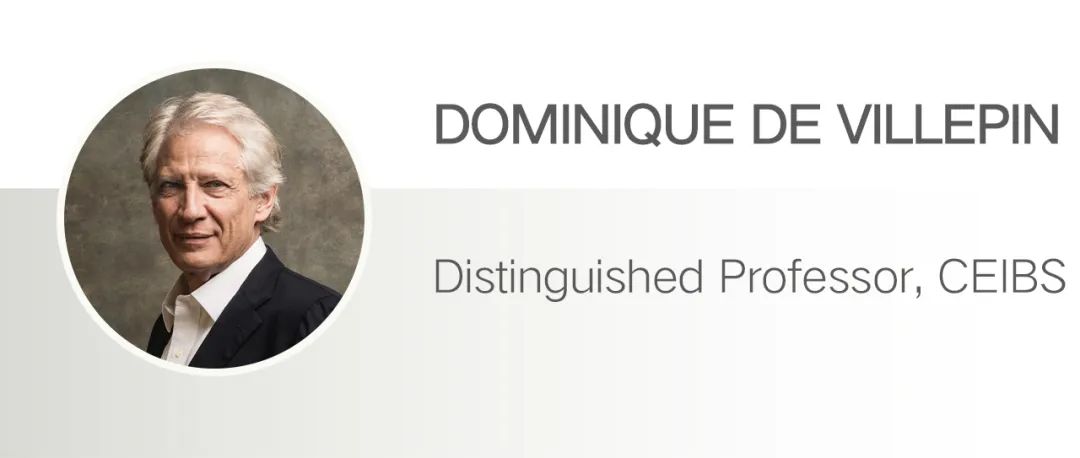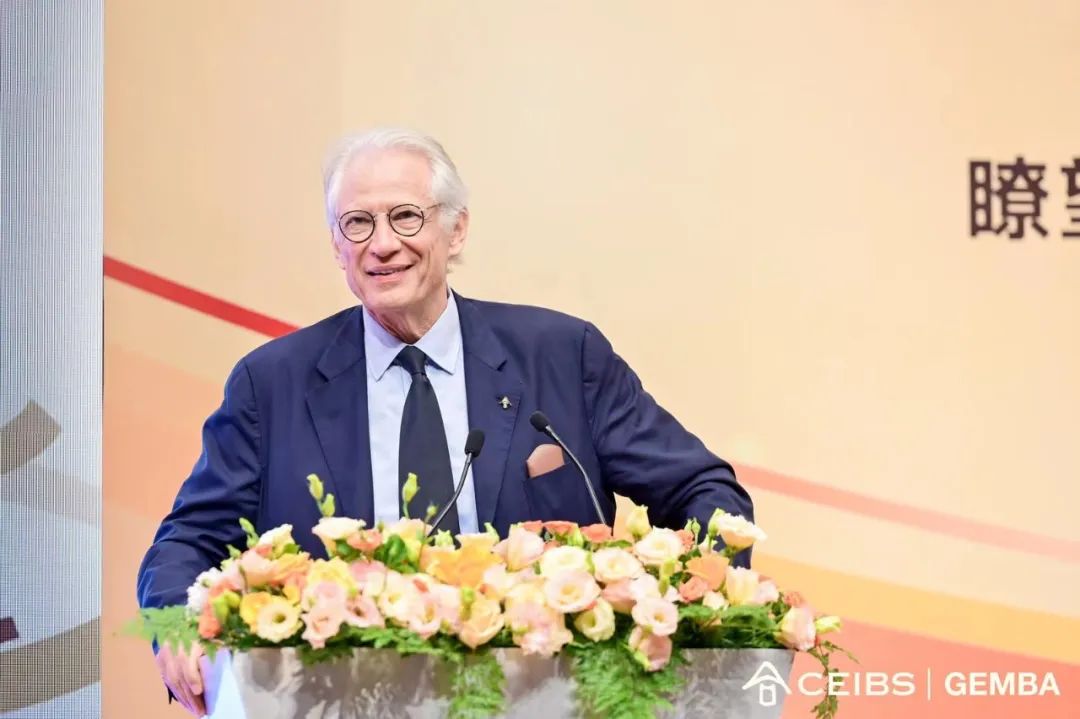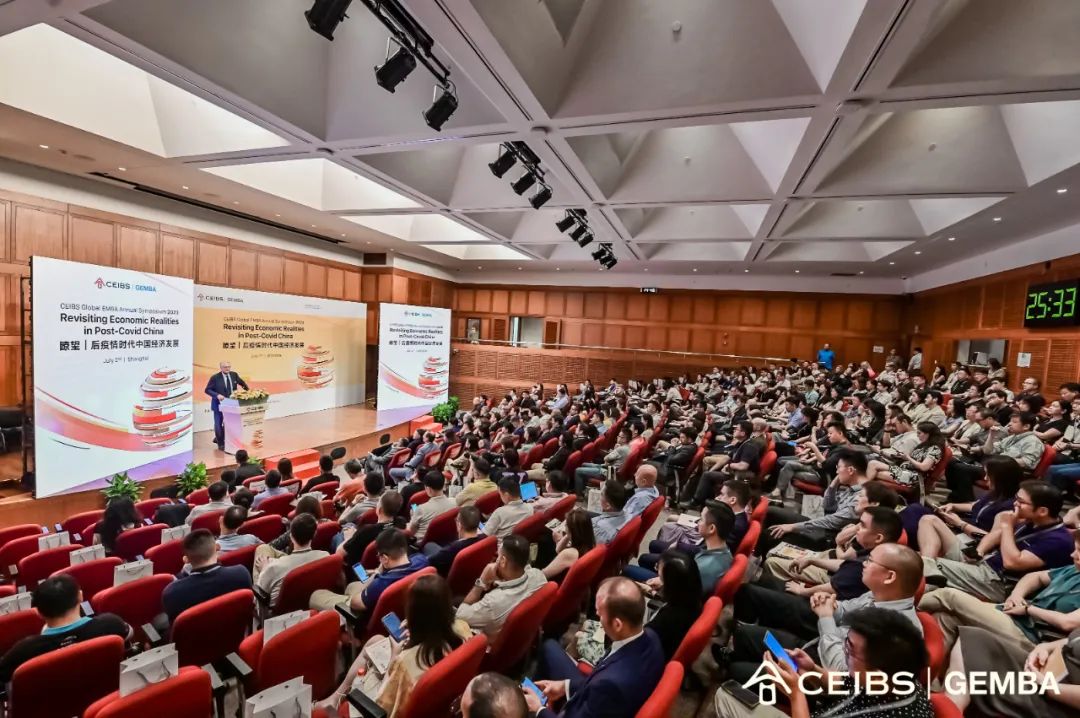The Power of Cultural Bridges in the New Global Economy

During his keynote speech at the 2023 CEIBS Global EMBA Annual Symposium, Professor Dominique de Villepin – Former Prime Minister of France – outlined his view of how the global economy is rapidly realigning itself. As old economic certainties give way in the face of explosive tech-based innovation and dramatic geopolitical manoeuvrings, the need to build bridges is greater than ever. Promoting cultural connections, embracing ‘soft power’, is the kind of bridge that may last longer in these uncertain times.
COVID may have 'left the room', but it has changed the building forever, inside and out. Bill Clinton famously described the world as being dominated by economics – this is the world of yesterday; today's world is dominated by politics. Today's politics, fluid and unpredictable as they are, have wiped away so many of the old assumptions about stable, reliable global GDP growth going hand in hand with technological progress and predictable international partnerships with commonly held rules and mutually understood principles.
The world is more complex than ever, and the severity of the challenges we face (at the domestic, international and global levels) force political leaders to constantly reappraise their position and priorities on everything from trade to national defence. Put together, the rising complexity, difficulty and unpredictability have injected a huge dose of suspicion into the bloodstream of current-day politics. Even as recently as ten years ago, political thinkers wholeheartedly embraced the 'win-win' concept – if we work together, we win together. Today, everybody is suspicious that the guy next door is going to win more than them.
Quality over Quantity – Consumer expectations are changing the game
The rise of this new political reality is ushering in a new global economy. It's more fragmented, fast-paced and responsive than the old one, as the world's most agile enterprises strain to leverage new technological innovations and novel business practices ahead of their competitors. From self-driving cars to 5G and IoT, technology is creating revolutionary new business models while simultaneously prompting consumers to evolve new expectations at a pace that leaves traditionally minded companies in the dust.
While technology is impacting different industries at different speeds, a common feature of the new global economy is that consumers are routinely favouring quality over quantity. Some are motivated by environmental concerns, others, their personal health and wellbeing. Lastly, there are some that are simply more aware of their options and are willing to 'vote with their wallet' to get a product that better fits their needs and outlook on life.
Companies destined to succeed in the new global economy are those who can deliver on quality while understanding exactly what that looks like to their individual customer. Not only is this driving a change in procurement, supply chains and distribution methods, it is also having a significant impact on branding. Companies with the best brand story, the most desirable products, packaged and presented according to evolving consumer values, are best placed to maintain their edge and their market share.

Corporate Social Responsibility – a chance to shape industries as well as markets
In the non-stop struggle for the hearts and minds of consumers, CSR is a key battleground of the new global economy. As well as greater quality, consumers also want more transparency regarding their purchases. They want to know where their products come from, who benefits from their creation and sale, what the lasting impact is on wider society and the environment. Crucially, they want to know if the brand selling them the product is a brand they can believe in, trust and admire.
We know that this consumer-led desire for transparency and responsibility is on the rise because every day there are new examples of high-profile brands being rewarded by consumers for their latest CSR efforts – or punished for their lack of interest. Greater sales and positive social buzz for the former, boycotting, online bashing and general berating for the latter. All the evidence suggests that those brands who continue to ignore this consumer desire are less likely to survive the changing economic and commercial environment.
Accordingly, leading global brands, and private enterprises in general, have a vital role to play in shaping the new global economy. They are not just selling their products – they are cultural trend makers and ambassadors for the values they claim to represent. In an increasingly fragmented world where old certainties are constantly being shaken up or even discarded, the cultural influence of brands will continue to grow, a form of soft power that can bolster ideologies for good or ill, to promote cross-border connections and understanding, or undermine them.

Building the Bridge – How do we overcome global division?
While private companies hold a significant amount of economic and 'soft' power, political leaders and international organisations remain best placed to tackle the complexity of today's challenges and shape the course of our shared future.
In a divided world, the best way to soften differences, to repair divisions, is to try to put forward what we have in common. Increasingly, our challenges are shared globally – the recent pandemic and a rising tide of climate change-related disasters striking at countries across the world are dramatic proof of this, underlining the need for greater stability and cooperation as the international community pulls together to stave off further catastrophe.
However, a common threat is not always enough to motivate people, companies and countries to act in common cause. There must be a 'pull' factor as well as an existential threat that forms the 'push'. In this case, the building of bridges based on shared culture and shared values may be the key to overcoming distrust and uncertainty. Beyond speaking the same language, sharing a common culture, or common principles, gives us a greater reason to accept to live with people who are different from us. This forms the basis of soft power, and it is a currency whose value is on the rise.
Taking the example of the Chinese economy, it has developed astonishingly quickly in recent decades, but China is yet to truly develop its own form of soft power, despite having huge potential to do so. Accordingly, the development of culture and art may yet form a new wave of Chinese economic growth. The age of real estate as a reliable growth engine is over, and theatres, cinemas, exhibitions, museums, artistic foundations and so on can create a new series of cultural ecosystems that elevate not only China's economic performance but also the lifestyle of its citizens and the beginnings of Chinese soft power.
To fully understand the importance of culture as a source of global power projection, China only has to look across the ocean at the US. For over one hundred years, 'The American Way' has dominated the lifestyle aspirations of billions of people beyond its borders. Hollywood, Coca-Cola, blue jeans and iconic music have imprinted American culture and values on the collective psyche of successive generations the world over. This cultural dominance, this global broadcasting of soft power, has made the US desirable. To achieve similar results, China must ask itself: "What must we do to make China desirable? What can we do to make people across the world fall in love with the Chinese lifestyle?" Bolstering the arts and cultural practices is one way to elevate a lifestyle to become universally desirable.
Beyond viewing cultural influence as a global competition, the promotion of culture, arts, common values and practices is the way ahead to secure global stability. Building bridges of common understanding and appreciation of what we share, rather than what we fear, could be the foundation of a new and more harmonious political world order, to go with our new global economy.











